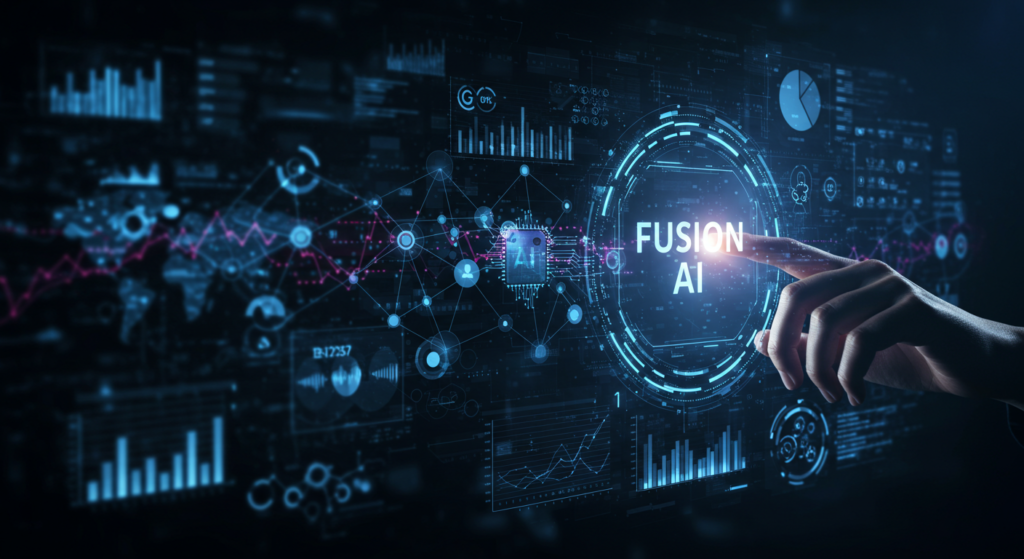
Table of Contents
Introduction
Fusion AI is revolutionizing how businesses operate by merging artificial intelligence (AI) and machine learning (ML) into a powerful suite of tools. Unlike traditional AI models that focus on isolated tasks, Fusion AI integrates multiple technologies to enhance efficiency, personalize experiences, and deliver actionable insights. From optimizing digital product development to creating intelligent virtual agents, this guide explores how Fusion AI works, its applications, and why it’s a game-changer for modern enterprises.
What is Fusion AI?
Fusion AI is a versatile toolkit that combines AI and ML to help businesses automate processes, analyze data, and build adaptive solutions. It acts as a bridge between raw data and strategic decision-making, enabling organizations to:
- Personalize user experiences for customers and employees.
- Generate real-time recommendations.
- Fine-tune workflows to align with business goals.
How Fusion AI Works?
Fusion AI operates through three core functionalities:
1. Behavioral Analysis & Adaptation
- User Behavior Tracking: Analyzes patterns in user interactions (e.g., clicks, search queries) to understand preferences.
- Dynamic Adaptation: Adjusts app interfaces, content, or recommendations based on real-time data.
- Example: An e-commerce app using Fusion AI to showcase personalized product suggestions.
2. Intelligent Recommendations
- Data Synthesis: Combines signals from internal systems (e.g., CRM, ERP) and external sources (e.g., market trends).
- Predictive Insights: Generates actionable recommendations, like upselling opportunities or process optimizations.
3. Goal-Oriented Search Optimization
- Contextual Search: Enhances search results by prioritizing content aligned with organizational objectives.
- Example: A company intranet using Fusion AI to surface HR policies when employees search for “remote work guidelines.”
Key Applications of Fusion AI
1. Digital Product Development
Fusion AI supports the entire product lifecycle:
- Strategic Definition: Identifies market gaps using competitor and customer sentiment analysis.
- Efficiency Analysis: Monitors post-launch performance (e.g., user engagement, bug detection).
2. Smart Business Applications
- Personalization Engines: Tailors app interfaces for users (e.g., dashboards for managers vs. field employees).
- Automated Workflows: Streamlines tasks like invoice processing or customer onboarding.
3. Intelligent Virtual Agents
- Multi-Provider Integration: Combines AI resources (e.g., ChatGPT for text, AWS Rekognition for images) to build advanced chatbots.
- Use Case: A virtual assistant resolving customer queries by pulling data from FAQs, transaction history, and inventory systems.
Real-World Examples of Fusion AI
1. AWS & BRQ Digital Solutions
- BRQ uses Fusion AI to help businesses automate repetitive tasks, such as data entry, reducing human error and boosting productivity by 30%.
2. Lucidworks
- Lucidworks’ Fusion AI suite enables companies to build custom search engines and recommendation systems. For instance, a retail client improved conversion rates by 25% using personalized product feeds.
3. Princeton Plasma Physics Laboratory
- While not a business tool, researchers here use AI to predict and prevent instabilities in nuclear fusion reactors—showcasing how “fusion” and “AI” intersect in scientific contexts.
Benefits of Fusion AI
- Enhanced Productivity: Automates up to 70% of repetitive tasks.
- Data-Driven Decisions: Unifies siloed data into actionable insights.
- Scalability: Adapts to growing data volumes and user bases.
Challenges to Consider
- Integration Complexity: Merging legacy systems with Fusion AI may require IT expertise.
- Data Privacy: Requires robust encryption and compliance with regulations like GDPR.
Future of Fusion AI
- Industry-Specific Solutions: Pre-built Fusion AI templates for healthcare, finance, and retail.
- AI Democratization: No-code platforms letting non-technical teams deploy AI tools.
Conclusion
Fusion AI is more than a buzzword—it’s a practical solution for businesses aiming to thrive in a data-driven world. By automating workflows, personalizing experiences, and turning insights into action, it empowers organizations to work smarter, not harder. Ready to explore Fusion AI? Start by auditing your workflows for automation opportunities!
FAQs:
Is Fusion AI the same as generative AI?
No. Generative AI creates content (e.g., text, images), while Fusion AI focuses on integrating and optimizing business processes.
Can small businesses use Fusion AI?
Yes! Platforms like Lucidworks offer scalable pricing models for SMBs.
Here you can learn more:
